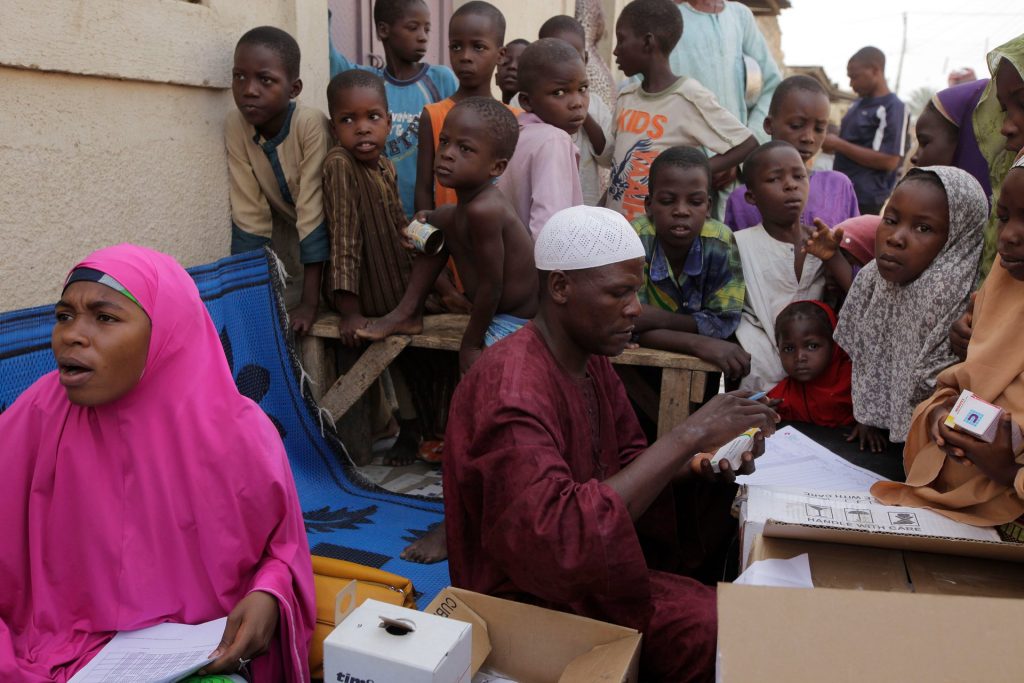
Photograph: Sunday Alamba/AP
In Nigeria, if we’re diligent and careful, we may never see another child lose the use of their legs to polio.
Thirty years ago, millions of children went unvaccinated against a preventable disease that persisted and paralysed in nearly every country in the world. Since then, the number of unvaccinated children has dropped precipitously. While we still have work to do to ensure not even one child is missed, the biggest challenge Nigeria has to contend with now is complacency.
On 24 July 2016, Nigeria reached two years without a case of wild polio. That is commendable. But if reaching this landmark has left many euphoric, total eradication would be historic. If Nigeria and the rest of Africa can make it to July 2017 without a case of polio, we will be officially polio free. To do this, we have to consolidate the progress we have already made, and vigorously invest in our collective capacity to contain and wipe out the disease wherever it may linger.
To banish polio from Nigeria and the rest of the continent, we must vaccinate every child. To miss even one would be to leave the door open for wild polio virus to return, or to risk outbreaks of vaccine-derived polio virus, a very rare form of polio that can emerge in under-immunised populations.
In Nigeria and across Africa, national governments have been instrumental in supporting this last-mile effort. So too have local civil society leaders, religious and traditional chiefs. All have been backed by the incredible commitment of the continent’s health workers. It is through these networks that we are able to quickly, aggressively and effectively respond to the last vestiges of polio in some of the most remote corners of the world.
Since President Muhammadu Buhari took office last year, he has clearly stated that he is committed to ending polio in Nigeria. Earlier this month, following a meeting with Dr Matshidiso Moeti, the World Health Organisation’s regional director for Africa, Buhari called for a reinvigorated approach to guaranteeing Nigeria’s polio-free status by prioritising public funding to health programmes and to innovative strategies that have enabled the country to immunise millions of children even in hard-to-reach and insecure areas. While national commitment is critical, state governors and local officials need to act on Buhari’s message. They must not only pledge to keep Nigeria polio-free, but also ensure all our children have access to the vaccines they need to protect them from killer diseases.
The health infrastructure built to eradicate polio need not disappear with the disease, either. The infrastructure and response mechanisms built to bring an end to polio can and should be repurposed into sustainable public health programmes and a functioning health infrastructure. We should care for our children with the same excitement we exhibit when bringing them into the world and not abandon responsibility to donors and international agencies.
Nigeria already has the opportunity to develop a great legacy. In the past two years, polio surveillance networks have been used to monitor and contain the 2014 Ebola outbreak, as well as responding to measles and rubella outbreaks throughout Africa.
Nigeria should also take the lessons learned from its emergency operations centres – which have been used to great effect for polio and were instrumental in stopping Ebola – to monitor and control disease outbreaks such as Lassa fever, and provide better health services to the large population of internally displaced people.
I know better than most that the obstacles that stand in the way of eradication are not to be discounted. The violent insurgency in north-east Nigeria has made routine vaccination exceedingly difficult in certain parts of the country, and finding and vaccinating children displaced by violence remains a major challenge. Nonetheless, the eradication of polio is not a luxury. We have come too far and invested too much to rest on our laurels.
Those who have dedicated their lives to improving public health are said to run on impossible idealism and a tenacious commitment to the greater good. Few of them are ever lucky enough to bring a definitive end to such a devastating disease. For all of the children whose lives have been irreparably damaged by an entirely preventable illness, let’s come together and call on our leaders at home and abroad to make polio a distant memory.
• Dr Oyewale Tomori is president of the Nigerian Academy of Science and chairman of Nigeria’s Expert Review Committee on Polio Eradication and Routine Immunisation

